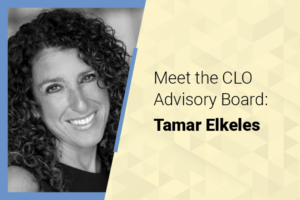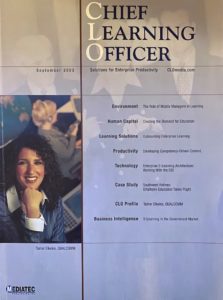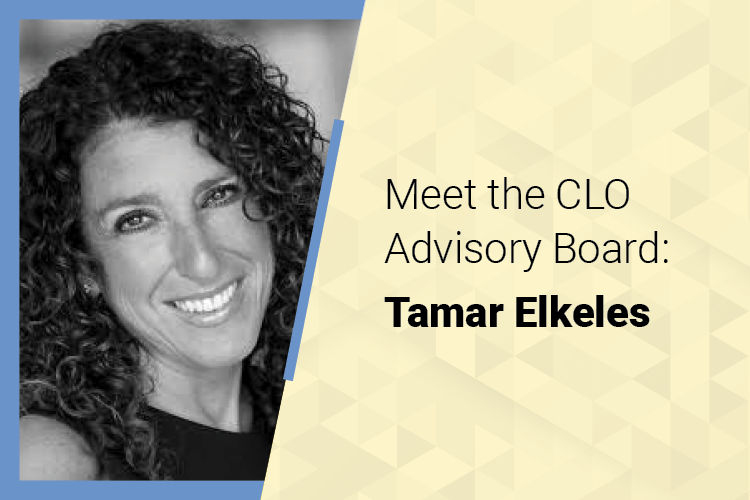 As we kick off 2021, Chief Learning Officer is pleased to recognize and highlight its Advisory Board. We recently sat down for a conversation with Tamar Elkeles, the chief human resources officer and head of HR for XCOM Labs. She is the former vice president of Qualcomm Learning Center, and was named CLO of the year in 2010.
As we kick off 2021, Chief Learning Officer is pleased to recognize and highlight its Advisory Board. We recently sat down for a conversation with Tamar Elkeles, the chief human resources officer and head of HR for XCOM Labs. She is the former vice president of Qualcomm Learning Center, and was named CLO of the year in 2010.
Chief Learning Officer: Where is your hometown?
Home is where your family is, so now it’s San Diego, but it definitely was Chicago.
CLO: How did you first become interested in learning and development?
I went to college at the University of Kansas, and there, I started working with autistic kids. These kids were diagnosed as being mute when I first started working with them, then I saw the power of learning and the power of behavior change. You could get a child who can’t speak to be able to say the word “mommy.” What you can do with reinforcement theory and what you can do with “training” people and continuously working with folks, you can get them to do pretty amazing things. Then I worked with developmentally delayed adults. There was a faculty member on campus who had gotten hit on his moped and had brain damage. Every time I came in to work with him, he had no idea who I was, but he could do math, no problem.
So you saw the difference in how your brain actually works, how you can really think about memory and how you can think about learning and relearning. What are the levers that you can use? With little kids, you’re using food, potentially, as a reinforcer, or a toy. With adults, sometimes it’s with money, sometimes it’s with a “thank you.” What is it that’s going to get you the behaviors that you want repeated, and what is it that’s going to get them to grow?
CLO: What lessons have you learned in 2020 that you plan on taking with you into 2021?
I think this is an inflection point. I’ve been doing mobile learning since 2000 — 20 years ago. In 1988, we got an award at Qualcomm for internet-based learning. I’ve been doing mobile learning forever. I’ve been saying we have to move online, and I’ve talked a lot about disruption. [Last] year, people got creative and learned how to survive in a disrupted world. So if you think about restaurants, these restaurants that were serving people all day long. Now, all of a sudden, they’re going, “We got to do takeout,” and they got very innovative. Or, “I’ve got to do outdoor dining,” which they didn’t have. Or cities needed to change the laws on serving alcohol, so you could take alcohol out from restaurants to help them survive. You think about the disruption in 2020, and it’s such a lesson for all of us to learn. If you would’ve told me a year ago that I would never be in an office and I would be doing all of my meetings online, I’d tell you, you were crazy. The things that we’re doing, the way we’re connecting with other people, the way that we’re continuing to do our work, to me, that’s the biggest lesson — is we can survive.
There are some things that we want to be able to leverage, I think, and especially in the workplace. The ways that people have found to collaborate, and the ways that people have started to become social. One thing that’s really interesting to me is that a lot of women were not able to enter the workforce, post their children, because they had to be in an office and they couldn’t do that.
CLO: Let’s talk about your new book, “Forward-Focused Learning: Inside Award-Winning Organizations” — how did you come up with the concept, and what would you like readers of this article to know?
There are many CLOs and heads of learning and talent development who have years of experience and so much expertise. It’s really time for us to give back. I went back to a lot of my colleagues and said, “Hey, would you be willing to share?” because I’ve learned so much from them. And in many ways — we sit in conferences, we listen to speakers and we get lots of knowledge — no one’s ever really captured that and put all of that into a book. And so we first started out calling it “Building an Award-Winning Learning Organization.” But we realized it’s mostly about being forward-focused. It’s about being progressive. It’s about not looking back, but looking ahead, and it’s about being very proactive and strategic as a learning organization. I took all of these leaders from different industries, different-sized companies, different parts of the world, and said, “Hey, tell us, share with us all of the knowledge that you have.” When you start to pull it all together, what you realize is, it’s all about being a strategic leader, and it’s all about the business. I say this all the time, we are business people first and learning people second.
CLO: How do you enjoy spending your time outside of work?
Is there time outside of work? Because of the situation that we’re in, it’s so blurred. Maybe it’s helped because I don’t have to get dressed, and run into my office, and deal with that commute time, and I can be pretty focused in meetings, but on the other side, it’s definitely impacted some of the personal side.
I’m in the wine business with Jack and Patti Phillips, and we’re all focused on ROI. You know about the five levels of training evaluation, right? It’s called Level Five. I have a Ph.D. in psychology, and I’m all focused on behavior change. And working in the wine industry, we go source and select fruit, which is like sourcing talent. We don’t have a winery. We want to find the best grapes that we can find, from the best region, same as you do with talent, and so we source that fruit, and we crush that fruit, and we put it into a barrel. We create the best that we can with the best grapes we have, but that wine becomes what it becomes. We can’t change it. When you take it out of the barrel, it is what it is in the glass. It is what it is in that bottle. We need to love it the way it is. So it’s taught us a lot about how there’s only so much you can change. There’s only so much you can control. A person, or a manager, or an engineer is the same as a bottle of wine — it is what it is.

CLO: What book, either audio or physical, or podcast has gotten you through 2020 and the pandemic?
Well, actually, writing my own, of course. I also love the podcast, Kamala: Next in Line. I do think that we are at an inflection point for women, and I feel really good about where we’re at because I do feel like one of the mantras that she has that I love (which her mom used to always say to her): “You may be the first Kamala, but do not be the last.” We may have achieved certain things as women, but it’s not about me, it’s about we. And whether you like her, you don’t like her, it doesn’t matter. It’s what she represents, for me. It shares with you her struggle, and how she got to where she was, and what happened, and her perseverance, and resilience.
CLO: In your opinion, what are some components of a robust L&D program?
Learning has to become part of the ecosystem of the company. It can’t be done just by a learning organization or by an L&D group. Learning needs to touch every part of the business. Every touch point with an employee is an opportunity to help them learn about the company, about the leadership, about the culture, about the values, about a new skill set. I really feel like the best L&D programs are the ones that really are seamless in their organization. They’re part of the ecosystem. A robust program is also a part of creating a learning culture. And that can’t just be from the learning organization. It needs to be everyone.
CLO: What advice do you have for CLOs and learning leaders as they take on 2021?
I would say disrupt yourself. Before they will do it to you. We need to focus on disrupting ourselves because if we don’t do it, it will happen elsewhere, and we’ve seen it this [past] year. Get creative, be opportunistic and figure out new ways of doing things. It’s a new world of work, and there’s a next generation coming. These kids who are graduating today from colleges are doing everything virtually. How does that change our learning organization?
Go disrupt what you’re doing. And if you’ve been doing something for the last five years, a program that you’ve been doing, an event that you’ve been doing, stop doing it and start over, because if you’re doing it for the last five years, it’s already obsolete. We become complacent, and I think that’s the one thing that I want us all to focus on — to ensure that we don’t focus on complacency. Instead, focus on disruption, and leverage positive change.
This article has been edited for brevity.















